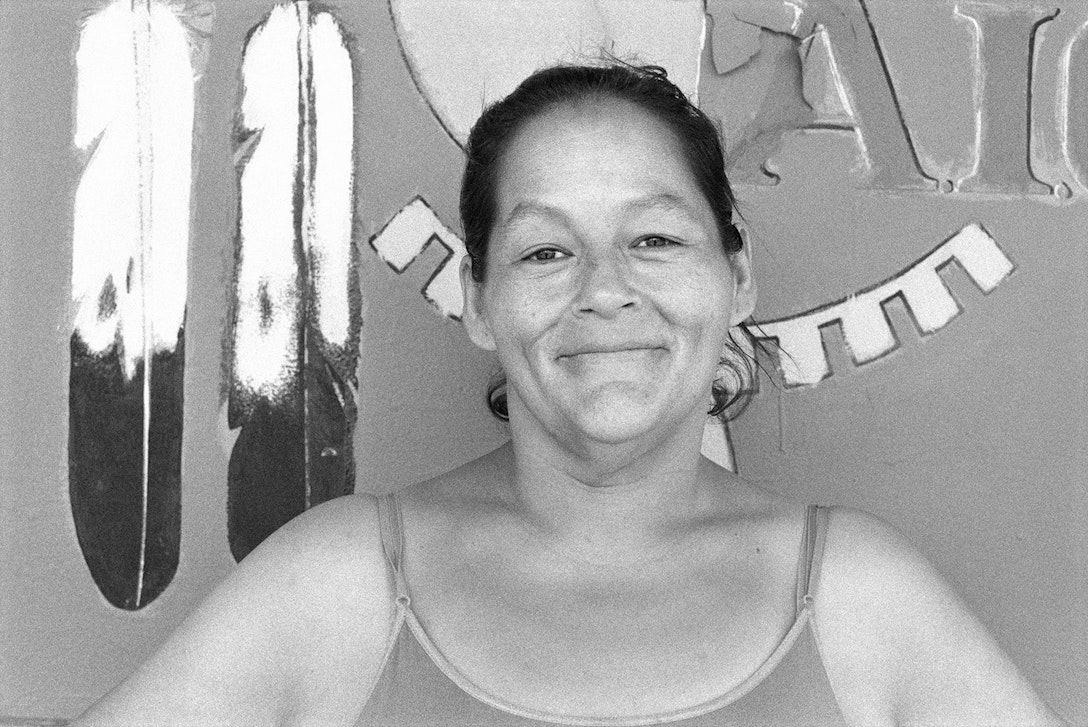
Eva S. Reyna
Albuquerque, New Mexico, USA
HOMELESS BUT GRATEFUL
My earliest memory of faith is from the time I was probably about 11. My mom was made aware of some issues that were going on at home regarding my safety. They came out and told her. She said, ‘Well you can just keep her. I don’t need her,’ and she took off. So, it was like, ‘What?’ I begged not to make it through but here I am, 42 years old and still kicking.
I’ve had to rely on God because of my health issues. I was just diagnosed with cancer. I’ve been on life support twice. Still kicking. Why? I don’t know. But I believe I’m here to teach myself some more things and teach other people ’cause there has to be a better way of life. There has to be. If I can prevent somebody from going through anything that I’ve gone through, then that means that I’ve got to. I mean, they gave me two years to live after I was diagnosed. I’m still here. And that’s by faith and the will of God because that’s not me. I’ve tried to end my life. I’m still here.
I’m grateful—not for where I live now, but for the opportunity to have lived it, and continue living it and hopefully come back and make it better. For even myself, my children, somebody else, or some young man or woman out there on the street. I’m back on the streets and so that’s a lot tougher to digest. I made it through the night and I’m here so it’s like ‘OK, let’s go. Let’s see what we can produce today.’ As long as I have something positive coming in, and I know that there’s something there, I’m grateful.
Tell people that I’m a strong, independent woman who realized I’m nobody but God.
Daniel’s Reflection
Eva Reyna lives on the streets of Albuquerque. She is Navajo. Eva was the first homeless person I interviewed for Portraits in Faith. I met her at a center that helps Native Americans without housing obtain food and clothing and provides a safe place to go during the day. Eva was known to my Portraits in Faith producer, Kim Delfina Gleason, from previous work she did with the homeless.
This experience surprised me. Eva was clean. She was thoughtful and fully present and did not appear to have the problems of an alcoholic or a drug addict. Eva was simply an impoverished woman who was without a home, living on the streets, with her husband.
Eva inspired me to seek data on what causes homelessness and whether it matched my own beliefs—that those who lack shelter are mentally ill or addicts, and, that any money I give to someone on the streets will be used for drugs and alcohol. But the data showed I was wrong.
An excellent article by Catherine Oliphant, “What I Learned from Being Homeless: A Spiritual Perspective,” published in Elephant Journal shared four relevant statistics from the National Law Center on Homelessness and Poverty:
For women in particular, domestic violence is a leading cause of homelessness.
The top causes of homelessness among families were lack of affordable housing, unemployment, poverty, and low wages, in that order.
The top four causes of homelessness among unaccompanied individuals were lack of affordable housing, unemployment, poverty, mental illness and the lack of needed services (also in that order).
Substance abuse and mental illness were the least common of the causes for homelessness.
If domestic violence is a leading cause of homelessness among women and affordable housing the leading cause for families, I cannot be judging or fearing those without homes in the ways I judged or avoided them in the past.
While wondering about the spiritual needs of those without shelter, I reached out to my dear friend and colleague, Karen Patterson, for perspective based on her years working in the community as a volunteer. I was struck by how loss, dignity, weariness, safety and stability, and rejection are issues we all face, but for those without housing they are extreme and life-threatening.
Loss: While everyone is impacted by loss, for those in and out of stable housing situations, soul- crushing losses can be ongoing, not just a handful of events over a lifetime (abandonment, death, eviction, rejection, job losses, dignity, precious possessions, etc.).
Dignity: As humans, we are designed to create and contribute. This is not just about productivity. It is part of how we worship and quickens our spirit. One man with whom I developed a relationship was an incredibly talented painter. While his livelihood was painting house interiors, he approached each project as if it were creating a masterpiece. Through a series of unfortunate events, he could not maintain consistent employment and ended up living on a riverbank.
Weariness: First there is being hungry. There is a state of living in ‘survival mode’ which can lead to exhaustion. This may lead to weariness of soul and a spiritual starvation. It is even more complicated when children are involved. I have seen exhaustion from being in constant survival mode.
Safety and Stability: Uncertainty is a way of life for people dealing with homelessness. It can lead a person to be less reliant on the physical and seek out a more spiritual existence. However, living without safety and shelter can be dangerous. People who are living on the streets are exposed to unsanitary conditions, assault, lice infestations, inclement weather, and diseases.
Rejection: You and I, the sheltered, have the resources to access materials, be in relationships, go to retreats, and to places of worship to nourish our spirits. It is different for people living without shelter. They do not have the same access or acceptance. And even if mental illness is not the primary driver of their unfortunate conditions, it is a confounding factor for many people living on the streets. Social stigmas and discrimination make living with mental illness challenging for all people. Lacking the security of shelter may increase fear, anxiety, or depression. Overcoming negative thoughts is a spiritual battle. When our basic needs are met and we feel secure, we are better able to cope with mental illness, problems, and illnesses in general.
I sought a number of sources across religions to reset my expectations for myself regarding the issue of extreme lack. Here are the five lessons I learned from this investigation:
#1 Stop Dehumanizing: In an article published by the Ethics & Religious Liberty Commission titled, “5 principles for ministering to the homeless,” Cameron Presson states: “...we should not be surprised, but should expect to learn from our homeless neighbors. It is not a one-sided affair but a mutual discipleship, and to see yourself as the only teacher is a grave mistake. As Dr. Andy Watts, my professor of Christian ethics has said, ‘We dehumanize people the moment we decide we have nothing to learn from them.’”
The best way to do this is by making eye contact and greeting each person as a fellow human being and not looking away.
#2 Stop Blaming: Mark Horvath in his project, “Invisible People,” says: “There is a direct correlation between what the general public perceives about homelessness and how it affects policy change. Most people blame homelessness on the person experiencing it instead of the increasing shortage of affordable housing, lack of employment, a living wage or the countless reasons that put a person at risk. This lack of understanding creates a dangerous cycle of misconception.”
So, when I encounter a homeless person, I need to see him or her without the judgment that they are perpetrators of their own fate.
#3 Practice Acts of Compassion and Engage in Advocacy: A new friend and person I greatly admire is Brian McLaren, a former pastor turned author and activist to bring about a more progressive Christian Church. When I asked Brian about the spiritual issues of homelessness for those who have a home, he shared this story:
“Back in about 1982, I received a call from a refugee resettlement organization. They had a Cambodian family arriving late that night, and their sponsors backed out at the last minute. Would Grace and I be willing to take them in? We said yes, and that opened us up to one of the most meaningful experiences of our lives.
“A family of three moved in with us. We found out we couldn’t get them an apartment legally... which meant they stayed with us for 10 months.
“After that, we took in another Cambodian family, a Vietnamese family, and some Ethiopians. In addition, we took in some homeless Americans, both of whom had mental health issues and turned out to be somewhat dangerous. Through all of this, it became clear to me that acts of compassion have to be matched with the work of advocacy, to be sure we have laws passed that help people get housing. Individuals have to do what they can, but the problems are too big for generous individuals to handle alone. So, I see the two kinds of work—compassion and advocacy—as going hand-in-hand.”
#4 Work to Prevent Housing Instability: In remarks offered by Rabbi Lucy Dinner at a speech for the Poor People’s Campaign, she shared a Jewish understanding of what we must do for homelessness:
“My heritage teaches that we have an obligation to support and fortify one another.
“The book of Leviticus instructs, ‘If your neighbor becomes poor...then you shall strengthen him, be he a stranger or a settler, he shall live with you” (Leviticus 25:35).
“The commentator Rashi teaches: ‘This can be compared to a burden on a donkey: While it is still on the donkey, one [person] may grab hold of it and hold up [the load, but if the donkey] falls to the ground, five cannot raise [the donkey].’”
“When we educate our population, ensure that everyone has a living wage and housing; we lift up those in need, and we lift our country. When we fail to ensure these safeguards, when we let our brothers and sisters fall to the ground, not even five times the resources can restore them or our community.”
Affordable, safe housing for battered women, for those with health care debt, and all those below the poverty line needs to be a priority. I admire greatly the policies that prioritize housing as first on the list. It is surprisingly obvious to prioritize housing for those who need homes.
#5 Change Cultural Norms: I was puzzled by Jesus’s quote in the New Testament when Jesus says, “there will always be the poor,” in response to Mary Magdalene spreading expensive oil on Jesus’s feet and wiping it with her hair when Judas says they could have fed many poor and hungry.
In his book, Palm Sunday: An Autobiographical Collage, Kurt Vonnegut, who describes himself as a “Christ-worshipping agnostic,” wrote an explanation of the incident. He thought Jesus may have meant that poor people would always live on this Earth, but this would be the only lifetime were he would be walking among them. Vonnegut goes on to say that maybe what Jesus said was a joke that allowed Him to be civil in that moment to Judas. Vonnegut surmised Jesus meant that any act of mercy to any person—wealthy or poor—was relevant in that its goodness would last.
My friend, pastor Victoria Loorz, M.Div., CSD, challenges our culture of accepting people without shelter as a norm: “I think the biggest spiritual issue is that homelessness is a thing at all in our culture. What we have to do in our souls when we walk by those who are living in the streets without sufficient shelter and usually food. How we have to shut down just a little more each time. How those living without homes sometimes find more acceptance and community on the streets than in their families and in the culture. How this Othering registers fear of ‘what is mine’ in wealthy communities and fear of ‘I will be next’ in other communities. Not all cultures are this way. Homelessness is not a ‘given;’ ...‘there will always be the poor’ is as much of an excuse now as it was when it was first said...mental illness, drug abuse, rejection, trauma, income inequality...all issues relatively unimportant to our culture. It is a red herring annoyance to most cities, a distraction drawing our attention away from our own hardened hearts. I say this in first person plural. I am part of the problem. There are too many ‘issues’...the culture itself is the issue.”
I am provoked most of all by the fact that there is even a reason for a person to lack housing. We have the global resources today to house people, including refugees. I remember seeing pictures of air-conditioned tents in Saudi Arabia that house a million pilgrims at a time who are on Hajj—tents that were not made available to Syrian refugees. People who lack shelter and are judged about it is a cultural norm that need not be perpetuated.
This has been a deep exploration for me on a topic I’ve not focused on in Portraits in Faith, or in my life, before now. I am grateful to Eva Reyna, her gratitude for life, and her tenacity. I asked Eva what she would like people to know about her and she said, “I’m a strong independent woman who realizes I’m nobody but God.”
REFERENCES & PERMISSIONS
Horvath, Mark. “Invisible People.” www.invisiblepeople.tv/about/
Oliphant, Catherine. “What I Learned from Being Homeless: A Spiritual Perspective.”
www.elephantjournal.com/2017/02/what-i-learned-from-being-homeless-a-spiritualperspective
Presson, Cameron. “5 principles for ministering to the homeless.”
https://erlc.com/resource-library/articles/5-principles-for-ministering-to-the-homeless/
Permission to quote text from the essay written by Cameron Presson was given to the author by
Elizabeth Bristow, press secretary for The Ethics & Religious Liberty Commission on March 12, 2021.
Religious Action Center of Reform Judiasim. Dinner, Rabbi Lucy. “If your neighbor becomes poor, then
you shall strengthen him.” Poor People’s Campaign: Education, Income and Housing. June 14, 2018.
https://rac.org/blog/if-your-neighbor-becomes-poor-then-you-shall-strengthen-him
(Note: “This post is adapted from remarks offered by Rabbi Lucy Dinner at the Poor People’s Campaign
day of action in Washington, D.C. on Monday, June 11, 2018. A video of her remarks is available on
Facebook, https://www.facebook.com/TheRAC/videos/10155375188177115/
Vonnegut, Kurt. 2009. Palm Sunday: An Autobiographical Collage. The Dial Press.
Explore the portraits by theme
- happiness
- grief
- faith
- addiction
- sexuality
- sobriety
- transgender
- alcoholism
- suicide
- homelessness
- death
- aggression
- cancer
- health
- discipline
- abortion
- homosexuality
- recovery
- connection
- enlightenment
- indigenous
- depression
- meditation
- therapy
- anger
- forgiveness
- luminaries
- interfaith
- worship
- salvation
- healing

